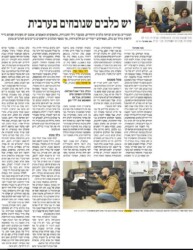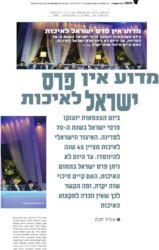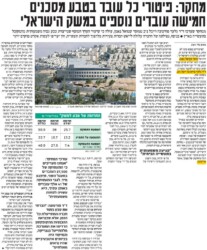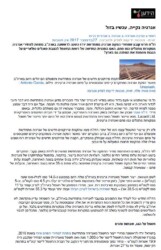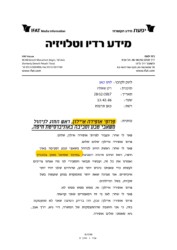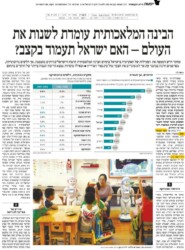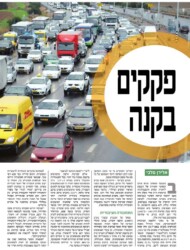Connect to schedule an interview
+972.4.829.2329
Neaman in the media
Some dogs barking in arabic
Young people bring home dogs and parents, once they resisted, fall in love and adopt. While there are places where it is rare to see a dog walk, and designated parks are a distant dream, the number of dogs registered in Arab communities is leaping.
Why is there no Israel Prize for Quality?
On Independence Day, Israel’s Prizes will be awarded in the 70s to the State. The Israel Quality Association marks its 45th anniversary. To date, the Israel Prize for Quality has not been awarded. Is there a chance that this will happen, and what is the connection to the lack of recognition of the quality profession
Laying off any TEVA worker puts another 5 different employees at risk
A study conducted by Dr. Gilead Fortuna and Yuval Neev of the Samuel Neaman Institute shows that the rate of added value produced by TEVA is significantly higher than the industrial standard in Israel. Therefore the impact of reducing the production of Teva in Israel on the work force and the supporting industries and services industries, will be very large
In addition, a significant reduction of Teva size in Israel could discourage young companies from becoming larger independent industrial companies, and they might prefer to make an exit rather than growth.
Clean energy, now cheap
A new report states that the prices of renewable energy production fell this year for the first time in the United States below energy prices from perishable sources such as coal. Is the new plan of the Electricity Authority to install solar panels on rooftops marks the turning point in Israel as well?
Prof. Ayalon emphasizes the need for efficiency in the electricity grid, prior to renewable energy
An interview with Ofira Ayalon in the program only a question
An interview with Prof. Ofira Ayalon on environmental issues with a focus on waste management, packaging law and carrier bags law
Artificial intelligence is about to change the world – will Israel keep pace?
Ofira Ayalon, Arnon Bentur, Ella Barzani, Daphne Getz, Eran Keter, Eran Leck, Sima Tziperfal, Avida Shoham, Roey Tzezana, Shlomo Rosenberg
A new study that maps Israeli academia’s activities in the field of artificial intelligence reveals: Israelis are strong in encryption but weak in robotics, publish many journals but do not close the gap with Singapore and Switzerland; And which institutions have the highest concentration of researchers in the field.
A comprehensive report by the Samuel Neaman Institute at the Technion maps the activity in the areas of artificial intelligence, data science and smart robotics in academia and in the local industry, and examines the strengths and weaknesses of Israel The report, published last month, It was commissioned and funded by the National Council for Research and Development (R & D) to formulate a national strategic plan to promote these areas.
Traffic jams in the barrel
Manuel Trajtenberg
The rate of road construction in Israel is calculated according to population expansion, and not according to the increase in the number of vehicles. When you add the failing public transport, the result is catastrophic.
In September 2018, the Samuel Neaman Institute published an outline for a change in the patterns of travel formulated by Prof. Manuel Trajtenberg. At the center of the outline is a comprehensive reform of vehicle taxation: a gradual elimination of the taxes currently imposed, and in place of payment according to distance, which varies according to the location, time and number of passengers in the vehicle.
Like the milkman of old times: the company that will make you not throw away junk
A commercial venture called LOOP seeks to revolutionize the way we consume many products. This is a new venture based on an old tradition: reuse of containers and packaging of products, as we used to do with the neighborhood milkman. The declared aim of the project is to reduce as much as possible the ecological footprint of the products we consume. “The move to multi-use packaging is a very important step on the way to the great goal of reducing the amount of waste, but we must stop and look at the full picture,” says Prof. Ofira Ayalon.
They work less, earn less: who will save the north, and how
16.5% of the Israeli population live in the Northern District, but only 14.7% of the employed.
The rate of participation in the labor force is relatively low and stands at only 58%, according to a report by the Samuel Neaman Institute at the Technion.16.5% of the Israeli population live in the Northern District, but only 14.7% of the employed. The rate of participation in the labor force is relatively low and stands at only 58%, according to a report by the Samuel Neaman Institute at the Technion.
According to the report, the average compensation per job in the manufacturing industry in the Northern District is about 80 percent of the average national job compensation – the lowest of all the districts except Judea and Samaria.
The (un)covered damage
The masks that have stormed into our lives in the past year are manufactured in unimaginable quantities and became a huge threat to the environment. They are tossed away everywhere and pollute public space, reaching rivers and oceans and into the stomachs of animals. They cannot be recycled, and their mass production requires a great deal of environmental resources.
However, the damage that the Covid-19 causes to the environment is not limited to masks. The unprecedented increase in the number of shipments from the supermarkets is also giving its signals, “The issue of shipments is insane,” says Prof. Ofira Ayalon of the Samuel Neaman Institute at the Technion. “and because of the law of carrier bags in the various supermarkets have switched to paper bags that we use for a quarter of an hour. This paper is no more environmentally friendly than the plastic bag.”

